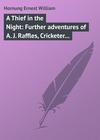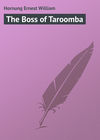Buch lesen: «Tiny Luttrell», Seite 11
CHAPTER XIV.
A CYCLE OF MOODS
But the girl herself chose to think otherwise. That was her perversity. She could now see excuses for her own ill-treatment in the past, but none for the revenge she had just taken on the man who had treated her badly. A revenge it had certainly been, plotted systematically, and carried out from first to last in sufficiently cold blood. But already she was ashamed of it. So sincerely ashamed was Christina, now that she had completed her retaliation and secured her triumph, that she very much exaggerated the evil she had done, and could imagine no baser behavior than her own. She had, indeed, felt the baseness of it while yet there was time to draw back, but the memory of her own humiliation had been her goad whenever she hesitated; and then the way had been made irresistibly easy for her. But this was no comfort to her now. Neither was that goad any excuse to her self-accusing mind; for she could feel it no longer, which made her wonder how she had ever felt it at all. Her judgment was obscured by the magnitude of her meanness in her own eyes. The revulsion of feeling was as complete as it was startling and distressing to herself.
In her trouble and excitement that night it became necessary for her to speak to someone, and she spoke with unusual freedom to Ruth, who displayed on this occasion, among others, a really lamentable want of tact. Tiny sought to explain her trouble: it was not that she could possibly care for Lord Manister again, or dream of marrying him under any circumstances (Ruth said nothing to all this), but that she half believed he really cared for her (Ruth was sure of it), in his own way (Ruth seemed to believe in his way); and in any case she was very sorry for him. So was Ruth. In all the circumstances the sorrow of Ruth might well have received a less frank expression than she thought fit to give it.
But it is only fair to say that this did not occur to Ruth. She was in and out of the room until at last Christina was asleep, and dreaming of the hall windows ablaze against the sunset, while again and again in her sleep the warm, broken voice of Lady Dromard turned hard and cold. Ruth watched her affectionately enough as she slept, and consoled herself for her own disappointment by the reflection that at least they understood one another now. Therefore it was a rude shock to her when Christina came down next day and would hardly look at any of them.
Her mood had changed; it was now her worst. She was pale still, but her expression was set, and there was a quarrelsome glitter in her eyes; the fact being that she was a little tired of chastising herself, and exceedingly ready to begin on some second person. So Erskine himself was badly snubbed at his own breakfast table, and when Tiny afterward took herself into the kitchen garden Ruth followed her for an explanation, in the fullness of her confidence that they understood one another at last. No explanation was given, Tiny merely remarking that she was sorry if she had been rude, but that she was in an evil state all through, and unfit for human society. To Ruth, however, this only meant that Tiny was unfit to be alone. So Ruth remained in the kitchen garden too, and was good enough to resume gratuitously her consolations of the night before. But in a very few minutes she returned, complaining, to her husband.
"My dear," said he at once, "you oughtn't to have gone near her. Above all, you shouldn't have broached the subject of her affairs; you should have left that to her. She seems considerably ashamed of herself, and though I must say I think that's absurd, you can't help liking her the better for it. She surprised us all, but she surprised herself too, because she has found that she can't strike a blow without hurting herself at least as badly as anybody else; and that shows the good in her. Personally, I think the blow was justified; but that has nothing to do with it. The point is that if she's mortified about the whole concern, as is obviously the case, it must increase her mortification to know that we know all about it, and that she herself has told us. Which applies more to me than to you. It was natural she should tell you; she only told me because I happened to be the first person she saw, and I can quite understand her hating me by this time for listening. We must ignore the whole matter except when it pleases her to bring it up, and then we must let her make the running."
"I hate people to require so much humoring!" exclaimed Ruth, with some reason.
"Well, I must say I'm glad that you don't," her husband said prettily. "As to Tiny, her faults are very sweet, and her moods are really interesting – but I'm thankful they don't run in the family!"
He seemed thankful.
"Yet you're a wonderful man for understanding other people," returned Ruth as prettily; and her eyes were full of admiration.
"Ah, well! Tiny's not like other people. I think she must enjoy startling one. Our best plan is to expect the unexpected of her from this time forth, and to let her be until she comes to herself."
And that came to pass quite in good time. Having effaced herself all the morning and again during the afternoon, and having been grotesquely polite to the others (when it was necessary to speak to them) at midday dinner, Tiny appeared at tea in another frock and flying signals of peace. She seemed anxious to acquiesce with things that were said. So Erskine forced jokes which were sufficiently terrible in themselves, but they served a good purpose very well. Christina recovered her old form, and after tea made a winsome assault upon no less redoubtable a defender of his own inclinations than her brother Herbert. Him she successfully importuned to take her to church in the evening, although not to the church close at hand, where there was never, necessarily, any service in the rector's absence. Tiny, however, had heard from her friends in the village of a gifted young Irishman who wore a stole and held forth extempore in a neighboring parish; they found their way to it across the twilight fields. They did not return till after nine, when Christina seemed much brighter than before. Her brightness, however, was seemingly more grateful to Mr. than to Mrs. Holland, who enticed her brother into the garden after supper, to ask him whether Tiny had not mentioned Lord Manister.
"Why, yes, she did just mention him," said Herbert; "but that's all. I wasn't going to say a word about the joker, and just as we came back to the drive here she got a hold of my arm and thanked me for not having asked her any questions; so I was glad I hadn't. She said she wasn't by any means proud of herself, and that she wanted to forget the whole thing, if we'd only let her. She doesn't want to be bothered about it by anybody. Those were her very words, as we came up the drive. She was jolly enough all the way there, talking mostly about Wallandoon. You'll have noticed how keen she is on the station ever since she went up there with the governor last April; I think the old place was a treat to her after Melbourne, to tell you the truth."
Ruth nodded, as much as to say that she knew. She asked, however, whether Tiny had talked also of Wallandoon on the way home.
"No; she was a bit quiet on the way home. I think the sermon must have made an impression on her, but I didn't hear it myself; I put in a sleep instead. In the hymns, though, she sang out immense – by ghost, as if she meant it! I rather wished I'd heard the sermon," remarked Herbert thoughtfully, "because it seemed to set her thinking. I believe she's given to thinking of those things now and then; I shouldn't be surprised to see her go religious some day, if she don't marry; I'd rather she did, too, than marry a thing like Manister!"
The next day was their last at Essingham, for which not even Ruth could grieve, in view of recent events. The day, however, was its own consolation; it was cold and dull and damp, though not actually wet, so that Erskine, who spent the greater part of the morning in front of a barometer, had hopes of some final sets in the afternoon, when the Willoughbys were coming to say good-by. Nor was he disappointed when the time arrived, though the court was dead and the light bad; his own service was the more telling under these conditions. But to the two girls, who had been brought up to better things, it was a repulsive day from all points of view, and they were very glad to spend the morning in packing up before a hearty fire.
"This is the kind of thing that makes one sigh for Wallandoon," Tiny happened to say once as she stood looking out of the window at gray sky and sullied trees. The thought was spoken just as it came into her head with an imaginary beam of bush sunshine. There was no other thought behind it – no human mote in that sunbeam certainly. But Ruth had raised her head swiftly from the trunk over which she was bending, and she knelt gazing at her sister's back as a dog pricks its ears.
"Why Wallandoon? Why not Melbourne?"
"Because I have had enough of Melbourne," replied Christina quietly, and without turning round.
"I thought you took so kindly to it?"
"Perhaps I did; I have taken kindly to many things that were bad for me in my time. And that's all the more reason why I should hanker after Wallandoon. I only wish we could all go back there to live!"
"Well, I must say I shouldn't care to live there now," remarked Ruth, with a little laugh; "and I don't see how you could like it either, after civilization."
"Ah, that's because you never cared for the station as I did," replied Christina, with her back still turned; "you liked the veranda better than the run, and you hated the dust from the sheep when you were riding. I can smell it now! Just think: they'll be in the middle of shearing by this time. They were going to have thirty-six shearers on the board, and they expected the best clip they've had for years. Can't you hear the blades clicking and the tar boys tearing down the board, and the bales being heaved about at the back of the shed – or see the fleeces thrown out on the table and rolled up and bounced into the bins – and father drafting in a cloud of dust at the yards? Can't I! Many's the time I've brought him a mob of woollies myself. And how good the pannikin of tea was, and the shearer's bun! I can taste 'em now. You never cared for tea in a pannikin. Yet perhaps if you'd ever gone back to see the place since we left it, as I did, you might be as keen on it as I am. I own I wasn't so keen when we lived there. When I went back and saw it the other day, though, I thought it the best place in the world; and you would, too."
"Is Jack Swift managing it now?" Ruth asked indifferently.
"You knew he was."
"Really I'm afraid I don't know much about it; but if you're so fond of the place as all that, Tiny, I should just marry Jack Swift, and live there ever after."
"I suppose you're joking," said the young girl rather scornfully; "but in case you aren't perhaps it will relieve you to hear that, if ever I do marry, I shall marry a man – not a place."
And she turned round and stared hard through another window, which commanded a view of the Mundham gates and grounds; and Ruth made no more jokes; but neither, on the other hand, did Tiny expatiate any further on the attractions of station life at Wallandoon.
The Willoughbys came in the afternoon, when Mrs. Willoughby was severely disappointed, owing to the rudeness of Christina, who had disappeared mysteriously, although she knew that these people were coming. Mrs. Willoughby had seen her last leaving the cricket ground at Mundham under the wing of Lady Dromard – Mrs. Willoughby had looked forward immensely to seeing her again. But Christina had gone out, and none knew whither; the visitor's idea was some private engagement at the hall; and this was not the only idea she expressed, a little too freely for the entire ease of Christina's sister. Happily they were only ideas. Mrs. Willoughby knew nothing.
Tiny, as it turned out later, had spent the whole afternoon in the village, saying good-by to her friends there. Ruth found this rather difficult to believe, as she had heard so little of the friends in question. Nevertheless it was strictly true, and Tiny had taken tea with Mrs. Clapperton, whose tears she had kissed away when they said good-by; but that was only the end of a scene which would have been a revelation to some who prided themselves on knowing their Tiny as well as anyone could know so unaccountable a person. At dinner that evening she seemed chastened and subdued, yet her temper, certainly, had never been sweeter. It was noticeable that, while she had a responsive smile for most things that were said, she made fun of nothing herself; and she was far too fond of making fun of everything. But for two whole days her moods had come and gone like the shadows of the clouds when sun and wind are strong together; and the last of her whims was not the least puzzling at the time. Later Ruth read it to her own extreme satisfaction; but at the time it did seem odd to her that anyone should desire a walk on so chilly and unattractive a night. Yet when they had left the men to themselves this was what Tiny said she would like above all things. And Ruth, who humored her, had her reward.
For she found herself being led through the churchyard; and when she hesitated as they came to the notice to trespassers, Tiny muttered in a dare-devil way:
"Lady Dromard gave me leave to come this way whenever I liked, and I mean to make use of my privilege while I can. I want to see the hall once again – it has a sort of fascination for me!"
More amazed than before, Ruth followed her leader up the western slope of Gallow Hill. The night was so dark that they heard the rustle of the beeches on top before they could discern their branches against the sky; and standing under them presently, panting from their climb, they gazed down upon a double row of warm lights embedded in blackness. These were the hall windows, in even tier, with here and there one missing, like the broken teeth of a comb. Outline the building had none; only the windows were bitten upon a sable canvas in ruddy orange and glimmering yellow, from which there was just enough reflection on the lawn and shrubs to chain them to earth in the mind of one who watched.
"Only the windows," murmured Tiny musingly. "Those windows mean to haunt me for the rest of my time."
"I wish it were moonlight," Ruth said. "I wish we could see everything."
"No, I like it best as it is," remarked Tiny, after further meditation. "It leaves something to your imagination. Those windows are going to leave my imagination uncommonly well off!"
They stood together in silence, and the beeches talked in whispers above them. When Ruth spoke next she whispered too, as though they were just outside those lighted windows:
"Yet you would rather live at Wallandoon than anywhere else on earth!"
Tiny said nothing to that; but after it, at a distance, there came a sigh.
"What's the matter, Ruth?"
"I'd rather not tell you, dear; it might make you angry."
"I think I like being made angry just at present," said Christina, with a little laugh; "but you've spiked my guns by saying that first; you are quite safe, my dear."
"Then I was thinking – I couldn't help thinking – that one day you might have been mistress – "
"Of the windows? Then it's high time we turned our backs on them! That's just what I was thinking myself!"
CHAPTER XV.
THE INVISIBLE IDEAL
On the flags of a London square, some days later, Ruth repeated the sigh that had succeeded on Gallow Hill, and once more Christina asked her what was the matter.
"I was thinking," said Ruth with a confidence born of the former occasion, "that one day all this, too, would have been more or less yours."
"All what, pray?"
"Every brick and slate that you can see! All this is part of the Dromard estate; they own every inch hereabouts."
Christina's next remark was a perfectly pleasant one in itself, only it referred to a totally different matter. And thus she treated poor Ruth. At other times she would herself rush into the subject without warning, and out of it the moment it wearied or annoyed her; to follow her closely in and out required a nimble tact indeed. Nor was it easy to know always the right thing to say, or at all delightful to feel that the right thing to-day might be the wrong thing to-morrow. But into this one subject Ruth was as ready to enter at a hint from Tiny as she was now contented to quit it at her caprice. The elder sister's patience and good temper were alike wonderful, but still more wonderful was her faith. Instinctively she felt that all was not over between Tiny and Lord Manister, and like many people who do not pretend to be clever, and are fond of saying so, she believed immensely in her instincts. It must not, however, be forgotten that her wishes for Tiny were the very best she could conceive; and it should be remembered that she had nobody but Tiny to watch over and care for, to think about and make plans for, during the long days when Erskine was in the City. This was the great excuse for Ruth, which never occurred to her husband, and was unknown even to herself. Christina was her baby, and a very troublesome, bad baby it was.
But what could you expect? The girl was sufficiently worried and unsettled; she was suffering from those upsetting fluctuations of mind which few of her kind entirely escape, but which are violent in characters that have grown with the emotional side to the sun and the intellectual side to the wall. In such a case the mind remains hard and green, while the emotions ripen earlier than need be; and the fault is the gardener's, and the gardener is the girl's mother. Now Mrs. Luttrell was a soulless but ladylike nonentity, with an eye naturally blind to the soul in her girls. All she herself had taught them was an unaffected manner and the necessity of becoming married. So Ruth had married both early and well by the favor of the gods, and Christina had restored the average by committing more follies of all sizes than would appear possible in the time. That in which Lord Manister was concerned had doubtless been the most important of the series, but its sting lay greatly in its notoriety. It had caused a light-hearted girl to see herself suddenly in the pupils of many eyes, and to recoil in shame from her own littleness. It had made her hate both herself and the owners of all those eyes, but men especially, of whom she had seen far too much in a short space of time. What she had done in England only heightened her poor opinion of herself now that it was done. She had seen her way to an incredibly sweet revenge, only to find it incredibly bitter. In striking hard she had hurt herself most, as Erskine had divined; instead of satisfying her naturally vindictive feeling toward Lord Manister that blow had killed it. Now she forgave him freely, but found it impossible to forgive herself; and so the generosity that was in a disordered heart asserted itself, because she had omitted to allow for it, not knowing it was there. Worse things asserted themselves too, such as the very solid attractions of the position which might have been hers; to these she could not help being fully alive, though this was one more reason why she hated herself. Her first judgment on herself, if a mere reaction at the beginning, became ratified and hardened as time went on. She became what she had never been before, even when notoriety had made her reckless – an introspective girl. And that made her twisty and queer and unaccountable; for, to be introspective with equanimity, you must have a bluff belief in yourself, which is not necessarily conceit, but Tiny was not blessed with it.
"She has lost her sense of fun – that's the worst part of the whole business!" exclaimed Erskine, one night when Christina had gone early to bed, as she always would now. "She has ceased to be amusing or easily amused. The empty town is boring her to the bone, and if I don't fix up our Lisbon trip we shall have her wanting to go back to Australia. However, I am bound to be in Lisbon by the end of next month, and I'm keener than ever on having you two with me. I know the ropes out there, and I could promise you both a good time – but that depends on Tiny. Let us hope the bay will blow the cobwebs out of her head; she wasn't made to be sentimental. I only wish I could get her to jeer at things as she used before we went to Essingham and while we were there!"
"Don't you think it's rather a good thing she has dropped that?" Ruth asked. "She had no respect for anything in those days."
"And her humor saved her! Pray what does she respect now?"
"Two or three people that I know of – my lord and master for one, and another person who is only a lord."
"Look here, Ruth, I don't believe it," cried Erskine, who by this time was pacing his study floor. "Why, she hasn't set eyes on him since the day she refused him – with variations."
"I know – but she's had time to reflect."
"Then I hope and pray she may never have the opportunity to recant!"
"Well, I won't deny that I hope differently," replied Ruth quietly; "but I've no reason to suppose there's any chance of it; and whatever happens, Erskine, you needn't be afraid of my – of my meddling any more."
"My dear girl, I know that," said he cordially enough; "but of course you tell her you're sorry for this, and you wish that. It's only natural that you should."
"Ah, I daren't say as much to her as you think," said Ruth, with a nod and a smile, for she was glad to know more than he did, here and there. "You needn't be afraid of me; I have little enough influence over her. She has only once opened her heart to me – once, and that's all."
Which was perfectly true, at the time.
But a few days later the restless girl was seized with a sudden desire to spend her money (which is really a good thing to do when you are troubled, if, like Christina, you have the money to spend), and as her most irregular desires were sure to be gratified by Ruth when they were not quite impossible, this whim was immediately indulged. It was rather late in the afternoon, but, on the other hand, the afternoon was extremely fine; and it was a Thursday, when men stay late in Lombard Street on account of next day's outward mails. Consequently there was no occasion for hurry; and so fascinated was Christina with the attractions and temptations of several well-known establishments, and last, as well as most of all, with those of the stores, that it was golden evening before they breathed again the comparatively fresh air of Victoria Street. It was like Christina to wish, at that hour, to walk home, and "through as many parks as possible"; it was even more like her to be extravagantly delighted with the first of these, and to insist on "shouting" Ruth a penny chair overlooking the ornamental water in St. James' Park.
Glad as she was to meet her sister's wishes, when she would only express them, which she was doing with inconvenient freedom this afternoon, Ruth did take exception to the penny chairs. Her feeling was that for the two of them to sit down solemnly on two of those chairs was not an entirely nice thing to do, and certainly not a thing that she would care to be seen doing. Knowing, however, that this would be no argument with Tiny, she merely said that it would make them too late in getting home; and that happened to be worse than none.
"Erskine said he wouldn't be home till eight o'clock; and he told us not to dress, as plain as he could speak," Tiny reminded her. "The other parks won't beat this; and you shall not be late, because I'll shout a hansom, too."
So Ruth made no more objections, though she felt a sufficient number; and they sat down with their eyes toward the pale traces of a gentle, undemonstrative September sunset, and were silent. Already the lamps were lighted in the Mall, where the trees were tanned and tattered by the change and fall of the leaf; at each end of the bridge, too, the lamps were lighted, and reflected below in palpitating pillars of fire; and every moment all the lights burnt brighter. Eastward a bluish haze mellowed trees and chimneys, making them seem more distant than they were; the noise of the traffic seemed more distant still, but it floated inward from the four corners, like the breaking of waves upon an islet; and here in the midst of it the stillness was strange, and certainly charming; only Tiny was immoderately charmed. She sat so long without speaking that Ruth leant back and watched her curiously. Her face was raised to the pale pink sky, with wide-opened eyes and tight-shut lips, as though the desires of her soul were written out in the tinted haze, as you may scratch with your finger in the bloom of a plum. She never spoke until the next quarter rang out from Westminster and was lingering in the quiet air, when she said, "Why have we never done this before, Ruth?"
"Well," answered Ruth, "I never did it myself before to-day; and I must own I think it's rather an odd thing to do."
"Ah, well, heaven may be odd – I hope it is!"
Ruth began to laugh. "My dear Tiny, you don't mean to say you call this heavenly?"
"It's near enough," said the young girl.
"But, my dear child, what stuff! The couples keep it sufficiently earthly, I should say – and the smell of bad tobacco, and that child's trumpet, and the midges and gnats – but principally 'Arry and 'Arriet."
"Now I just like to see them," said Christina, for once the serious person of the two, "they're so awfully happy."
"Awfully, indeed!" cried Ruth, with a superior little laugh. "Very vulgarly happy, I should say!" And Tiny did not immediately reply, but her eyes had fallen as far as the fretwork of the shabby foliage in the Mall, over which the sky still glowed; and when she spoke her words were the words of youthful speculation. She seemed, indeed, to be thinking aloud, and not at all sure of the sense of her thoughts.
"Very vulgarly happy!" she repeated, so long after the words had been spoken that it took Ruth some moments to recall them. "I am trying to decide whether there isn't something rather vulgar about all happiness of that kind – from the highest to the lowest. Forgive me, dear – I don't mean anything the least bit personal – I find I don't mean a word I've said! I wasn't thinking of the happiness itself so much, but of the desire for it. Oh, there must be something better for a girl to long for! There is something, if one only knew what it was; but nobody has ever shown me, for instance. Still there must be something between misery and marriage – something higher."
Her eyes had not fallen, but they shone with tears.
"I don't know anything higher than marrying the man you love," said Ruth honestly.
"Ah, if you love him! There is no need for you to know a higher happiness, even if one were possible in your case. But look at me!"
"You must marry, too," said Ruth with facility.
"As I probably shall; but to be happy, as you are happy, one ought to be fond of the person first, as you were; and – well, I don't think I have ever in my life felt as you felt."
"Stuff!" said Ruth, but with as much tenderness as the word would carry.
"I wish it were," returned Christina sadly; "it's the shameful truth. I have been going over things lately, and that's never a very cheerful employment in my case, but I think it has taught me my own heart this time. And I know now that I have never cared for anyone so much as for myself – much less for Lord Manister! If I had ever really cared for him I couldn't have treated him as I have done – no, not if he had behaved fifty times worse in the beginning. I was flattered by him, but I think I liked him, though I know I was dazzled by – the different things. I would have married him; I never loved him – nor any of the others!"
"Ah, well, Tiny, I am quite sure he loves you."
"Not very deeply, I hope; I can't altogether believe in him, and I don't much want to. It is bad enough to have one of them in deadly earnest," added Christina after a pause, but with a laugh.
"Is one of them – I mean another one?" asked Ruth, correcting herself quickly.
Tiny nodded. She would not say who it was. "I don't care for him either – not enough," she, however, vouchsafed.
"Then you don't think of marrying him, I hope?"
"No, not the man I mean" – she shook her head sadly at trees and sky – "I like him too much to marry him unless I loved him. Only if anyone else asked me – someone I didn't perhaps care a scrap for – I don't know what mightn't happen. I feel so reckless sometimes, and so sick of everything! This comes of having played at it so often that one is incapable of the real thing; more than all, it comes of growing up with no higher ideal than a happy marriage. And there must be something so much nobler – if one only knew what!"
Very wistfully her eyes wandered over the fading sky. The thin, floating clouds, fast disappearing in the darkness, were not less vague than her desires, and not more lofty. Her soul was tugging at a chain that had been too seldom taut.
"I know of nothing – unless you're a bluestocking," suggested poor Ruth, "or go in for Woman's Rights!"
Then the sights and sounds of the place came suddenly home to Christina, and her eyes fell. A child rattled by with an iron hoop. A pleasure boat, villainously rowed, passed with hoarse shouts through the pillar of fire below the bridge and left it writhing. Her eyes as she lowered them were greeted with the smarting smoke of a cigar, and her nostrils with the smell that priced it. The smoker took a neighboring chair, or rather two, for he was not without his companion.
Christina was the first to rise.
"I have been talking utter nonsense to you, Ruth," she whispered as they walked away; "but it was kind of you to let me go on and on. One has sometimes to say a lot more than one means to get out a little that one does mean; you must try to separate the little from the lot. I've been talking on tiptoe – it was good of you not to push me over!"




















